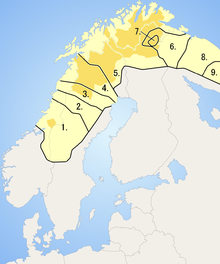
Sami is a group of languages spoken by the Sami people who dwell in northern Europe. Their traditional homeland consists of the central and northern parts of Norway and Sweden, northern Finland, and the Kola Peninsula in Russia, although they are now a minority in most of this area.
Because of earlier language politics, not all Sami speak Sami and some Sami languages are extinct. There are nine living Sami languages. They are Finno-Ugric languages and thus have many linguistic similarities and some common vocabulary (including many loanwords) with e.g. Finnish, Karelian and Estonian. The similarities are not enough for understanding, but greatly help in learning the language. Even the Sami languages are generally not mutually intelligible, but many Sami understand the neighbouring languages. There are also loanwords from the unrelated Scandinavian languages Norwegian and Swedish.
Northern Saami (davvisámegiella), the most spoken Sami language and the one used in this phrasebook, is spoken mainly in northern Norway, northern Sweden and much of the Sámi area in Finland. It is used often in towns such as Kiruna (Giron), Utsjoki (Ohcejohka), Kautokeino (Guovdageaidnu) and Karasjok (Kárášjohka).
Pronunciation guide
Like Finnish, Sami is written quite phonetically, with a certain letter mostly pronounced the same way and doubled letters meaning longer sounds (but "á" is pronounced as a long "a" in western dialects). Northern Sami uses the Latin alphabet with some extra letters, some of which are not found in Swedish, Norwegian or Finnish. The current writing system is from 1979, modified in 1985.
Below are the vowels and consonants, with name of the letter (spelt in Sami) and normal pronunciation with IPA codes.
Vowels
A Á E I O U
| A a | Á á | E e | I i | O o | U u |
|---|---|---|---|---|---|
| a | á | e | i | o | u |
| (IPA: /ɑ/) | (IPA: /a/) | (IPA: /e/) | (IPA: /i/) | (IPA: /o/) | (IPA: /u/) |
Consonants
B C Č D Đ F G H J K L M N Ŋ P R S Š T Ŧ V Z Ž
Note that Đ đ in Sami is a different letter from the Icelandic Ð ð and African Ɖ ɖ, although sometimes similarly looking.
| B b | C c | Č č | D d | Đ đ | F f | G g | H h |
|---|---|---|---|---|---|---|---|
| be | ce | če | de | đe | eff | ge | ho |
| (IPA: /b/) | (IPA: /ts/) | (IPA: /tʃ/) | (IPA: /d/) | (IPA: /ð/) | (IPA: /f/) | (IPA: /ɡ/) | (IPA: /h/) |
| J j | K k | L l | M m | N n | Ŋ ŋ | P p | R r |
| je | ko | ell | emm | enn | eŋŋ | pe | err |
| (IPA: /j/) | (IPA: /k/) | (IPA: /l/) | (IPA: /m/) | (IPA: /n/) | (IPA: /ŋ/) | (IPA: /p/) | (IPA: /r/) |
| S s | Š š | T t | Ŧ ŧ | V v | Z z | Ž ž | |
| ess | eš | te | ŧe | ve | ez | ež | |
| (IPA: /s/) | (IPA: /ʃ/) | (IPA: /t/) | (IPA: /θ/) | (IPA: /v/) | (IPA: /dz/) | (IPA: /dʒ/) |
Common diphthongs
Phrase list
Basics
- Hello.
- Bures. ( )
- Hello. (informal)
- Bures bures. ( )
- How are you?
- Mo dat manná? ( ?)
- Fine, thank you.
- Dat manná bures, giitu. ( )
- What is your name?
- Mii du namma lea? ( ?)
- My name is ______ .
- Mu namma lea ______ . ( _____ .)
- Nice to meet you.
- Somá deaivvadit. ( )
- Please.
- Leage buorre. ( )
- Thank you.
- Giitu. ( )
- You're welcome.
- Leage buorre. ( ):. ()
- Yes.
- Juo/Jo. ( )
- No.
- Ii. ( )
- Excuse me. (getting attention)
- Ándagassii. ( )
- Excuse me. (begging pardon)
- Ándagassii. ( )
- I'm sorry.
- Ándagassii. ( )
- Goodbye
- Báze dearvan (to one person). ( )
- Goodbye
- Báhcci dearvan (to two people) ( )
- Goodbye
- Báhcet dearvan (to more than two people) ( )
- See you!
- Oaidnaleabmai!( )
- I don't speak Saami [well].
- Mun in hála sámegiela. ( [ ])
- Do you speak English?
- Hálatgo eaŋgalasgiela? ( ?)
- Is there someone here who speaks English?
- Hállágo giige dáppe eaŋgalasgiela? ( ?)
- Help!
- Veahket! ( !)
- Look out!
- Fárut! ( !)
- Good morning.
- Buorre iđit. ( )
- Good afternoon
- Buorre beaivvi. ( )
- Good evening.
- Buorre eahket. ( )
- (Reply to above)
- Ipmel atti. ( )
- Good night.
- Buorre idjá. ( )
- Good night (to sleep)
- Buorre idjá. ( )
- I don't understand.
- Mon in ádde. ( )
- Where is the toilet?
- Gos hivsset lea? ( ?)
Problems
Numbers
½ - beal
0 - nolla
1 - okta
2 - guokte
3 - golbma
4 - njeallje
5 - vihtta
6 - guhtta
7 - čiežá
8 - gavcci
9 - ovcci
10 - logi
11 - oktanuppelohkái
12 - guoktenuppelohkái
20 - guoktelogi
21 - guoktelogiokta
30 - golbmalogi
40 - njealljelogi
50 - vihttalogi
100 - čuođi
200 - guoktečuođi
300 - golbmačuođi
400 - njeallječuođi
500 - vihttačuođi
1000 - duhat
2000 - guokteduhat
3000 - golbmaduhat
4000 - njealljeduhat
5000 - vihtaduhat

